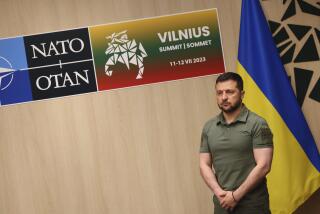One Sentence Deleted and Deal Is Done
- Share via
COLOGNE, Germany — The final breakthrough that cleared the way for the Yugoslav military’s withdrawal from Kosovo began unexpectedly Wednesday at a meeting here of eight leading foreign ministers originally called to deal with issues unrelated to the Balkan war.
After drafting a United Nations resolution Tuesday outlining a peace process for Kosovo, the ministers from Russia and seven leading industrial nations--the United States, Britain, Japan, Germany, France, Italy and Canada--had moved on to other subjects when Russia’s Igor S. Ivanov abruptly brought them back to Kosovo.
Without warning, he launched a verbal attack on NATO countries, accusing them of deliberately introducing new and unreasonable demands to stall the military talks between Yugoslav and alliance officials underway at Kumanovo, Macedonia, near the border with Kosovo, a southern province of Serbia, the dominant Yugoslav republic.
The purpose of the demands, Ivanov charged, was to prevent completion of the technical talks on the withdrawal of Yugoslav troops so that the alliance could continue its punishing airstrikes.
The Russian’s outburst came about half an hour after the military talks had broken off without the much-anticipated agreement.
When Ivanov finished, Secretary of State Madeleine Albright asked for the room to be cleared. Only the ministers and one senior aide from each country should stay, she said.
A senior U.S. official recounted that Albright then explained the problem to her colleagues: There was a dispute over a single sentence in a document spelling out technical issues of the military withdrawal and that, she said, was all that stood in the path of a breakthrough. The offending sentence, she told them, stated that if Yugoslav forces began their pullout and NATO announced a suspension of airstrikes, the Security Council must pass the U.N. resolution legitimizing the peacekeeping operation within 24 hours or the bombing would resume.
Yugoslav military leaders reportedly balked, arguing that it was impossible for them to agree to such wording when they had no control over the timing of the Security Council vote.
Although U.S. officials were vague about the details, the sentence apparently was inserted into the military agreement hurriedly by the North Atlantic Treaty Organization after Russian representatives at the United Nations seemed to hesitate about locking in final wording of the war-ending resolution--which their own foreign minister had helped draft in Bonn on Monday and signed off on the following day.
Those signs of apparent hesitation set off alarm bells in NATO capitals and prompted visions of the alliance’s nightmare: that it would be lured into a bombing pause but suddenly not have the U.N. resolution needed before the international peacekeeping force could enter the province and restore order.
Worried about Moscow’s posture in New York, Albright had raised the issue with Ivanov at a breakfast meeting Wednesday between the two and received assurances that Russia would not hold up the resolution. Still, the sentence in question remained in the draft military agreement.
Sources close to Ivanov’s delegation said the Russians were humiliated that the wording remained despite the pledge of their foreign minister. For Moscow, already deeply wary of the alliance and desperate to stop the bombing, it raised suspicions that NATO wanted to sabotage the Macedonian talks.
Addressing her seven colleagues, Albright reportedly informed them of Ivanov’s assurances and suggested that the Russian’s word was good enough.
“After some discussion, the ministers agreed the sentence was unnecessary and irrelevant,” the official said. “They decided to instruct their governments to consult [within] NATO and urged dropping the sentence, which was done.”
The last barrier to completing the technical military talks was gone.
It was after 5 p.m. here as word left Germany for Macedonia to strike the sentence. Events then moved quickly.
Within an hour, half a world away in New York, the U.N. Security Council draft resolution on Kosovo “went into blue”--a procedure of locking in the wording of a resolution before a vote, then printing it on blue paper.
By 9 p.m., the Yugoslav military officers had returned to Kumanovo. They signed the agreement shortly afterward.
More to Read
Sign up for Essential California
The most important California stories and recommendations in your inbox every morning.
You may occasionally receive promotional content from the Los Angeles Times.













